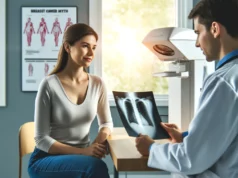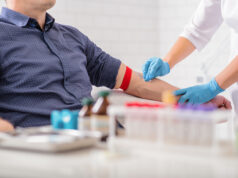Most people are familiar with the taboos and hush-hush attitude surrounding menstruation — but did you know a similar culture exists around menopause?
Menopause refers to the exact point in time when it’s been 12 months since someone experienced menstruation. More often than not, menopause is treated as a simply a phase of life people with vaginas must endure. In reality, the menopausal transition is an extensive and emotionally exhausting process with substantial physical manifestations.
Because actionable and comprehensive information about perimenopause, menopause, and postmenopause is hard to come by, we spoke to Evvy’s founders about the ways menopause affects people with vaginas and what you can do to mitigate symptoms if you or someone you know is experiencing them.
How does menopause affect sex drive?
During perimenopause (the time leading up to menopause), certain hormones begin to decline. Once someone reaches menopause, they will experience a significant decrease in estrogen levels which—you guessed it—causes sex drive to go down.
This estrogen-infulenced drop in sex drive isn’t just mental, it’s physical too. Both arousal (ICYMI the vagina often lubricates itself, a.k.a gets wet, when turned on) and achieving orgasm become increasingly unattainable. To put a number behind it, more than 30 percent of women who are perimenopause or postmenopausal experience a lack of interest in having sex, general sexual differences, and trouble orgasming.
As you can imagine, these changes can feel awkward, embarrassing, and overwhelming to navigate, especially if you have to communicate them to a partner.
Fortunately, thanks to doctors, communities that encourage knowledge sharing, and sex therapists, we are more aware now of how a menopausal person can reimagine and eventually enjoy their sex life.
While pentatrative sex may no longer create arousal for menopausal people, other forms of intimacy souch as foreplay, oral sex, and sex toys can facilitate better orgasms. Practices like Pelvic Floor Therapy can mitigate pain with sex. Finally, someone who is experiencing both menopause and a lower sex drive should know that they can always talk to their provider about medical treatments and further options.
Know that regardless of your age or physical condition, you deserve to have a fulfilling sex life and a partner who can listen and communicate with you to achieve that.
Menopause and Body Changes
Just like people with vaginas experience shifts in their physical appearance when they go through puberty, hormonal changes during menopause can cause one to gain weight around the abdomen. That, compounded with age-related weight gain (loss of muscle and increase of fat), can make it harder for menopausal to retain the body they had before going through this transition.
And while there is endless societal pressure (especially in Western countries) for women to stay thin, it’s important to practice compassion with yourself as your body changes.
Menopause and The Vaginal Microbiome
The vaginal microbiome is a complex ecosystem of bacteria, fungi, and more that lives in your vagina. Within this microbial community, protective bacteria play an important role in maintaining your vagina’s health while fighting off potentially disruptive bacteria from colonizing this delicate environment.
Going through menopause can impact the vaginal microbiome because of the decrease in certain hormone levels, such as estrogen and progesterone.
“Estrogen is a key contributor to the healthy growth of protective bacteria like Lactobacilli.” said Priyanka Jain, Evvy Co-Founder & CEO. “Because of the decrease in estrogen and its impact on Lactobacilli, entering menopause may result in being more predisposed to infections.”
Women have the opportunity to empower their health journey by learning more about their personal makeup. Companies such as Evvy are leading the way by offering at-home testing kits for your vaginal microbiome. While this is not intended as a diagnostic tool, the results offer women and people with vaginas unique insights into their vaginal health.
The TLDR on Hot Flashes
Though it sounds more like the name of an 80’s hard rock ensemble, hot flashes can actually be an incredibly uncomfortable by-product of the menopausal transition.
While hot flashes can be more intense for some than others, symptoms include an intense feeling of heat spreading across your chest and face, night sweats, elevated heartbeat, sweating, and anxiety. A hot flash can happen at any time and many people even experience them during the day which can be disruptive to normal lifestyle activities.
Luckily, there are medical treatment options and lifestyle changes that you may choose to make. Avoiding certain stimulants, such as alcohol, spicy food, and coffee alleviates symptoms for some. If you feel like you’ve tried all the tricks in the book and you’re still having discomfort, have a candid conversation with your doctor and ask them about hormonal treatment options.
The Takeaway
Because the menopausal transition is something that occurs later in life, like many other aspects of the elder experience, many people don’t receive the attention, resources, and respect they need to go through menopause with dignity.
“Arming women with data so that they can better understand their own bodies is so important,” explains Priyanka Jain, Evvy Co-Founder & CEO. “Moreover, giving women the language to describe their experiences and make better decisions as it relates to their overall and vaginal health is essential for creating a more equitable future in medicine and the treatment of patients—regardless of their age.”
About Evvy
Evvy is an innovative healthcare brand building a new understanding of the female body. Founded by Priyanka Jain and Laine Bruzek, the company aims to close the gender health gap by researching the overlooked biomarkers in the female body—starting with the vaginal microbiome. The company’s revolutionary at-home vaginal microbiome test empowers people with vaginas to gain unprecedented insights into their health.
Evvy does not provide medical advice or diagnose customers with medical conditions.












